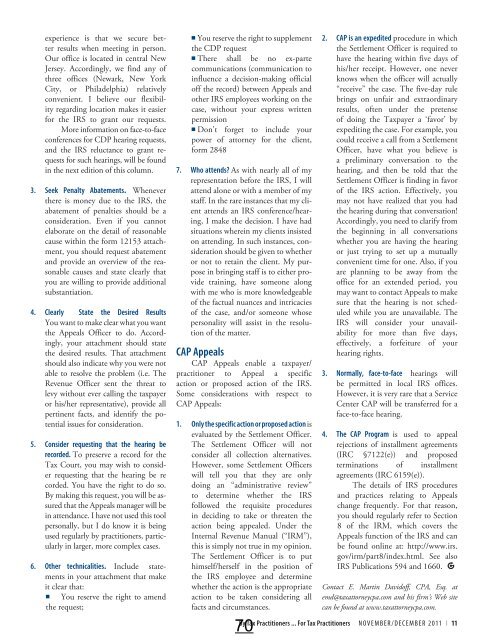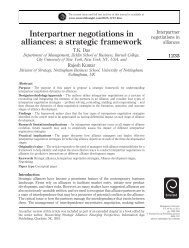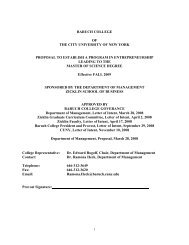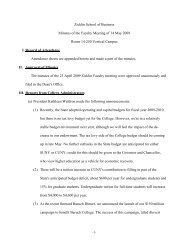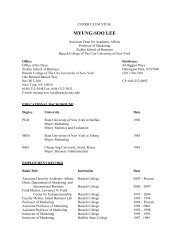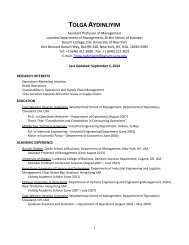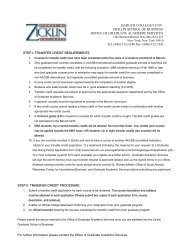Tax Seminar #3 – December 3 2012
Workbook - Zicklin School of Business
Workbook - Zicklin School of Business
Create successful ePaper yourself
Turn your PDF publications into a flip-book with our unique Google optimized e-Paper software.
experience is that we secure better<br />
results when meeting in person.<br />
Our office is located in central New<br />
Jersey. Accordingly, we find any of<br />
three offices (Newark, New York<br />
City, or Philadelphia) relatively<br />
convenient. I believe our flexibility<br />
regarding location makes it easier<br />
for the IRS to grant our requests.<br />
More information on face-to-face<br />
conferences for CDP hearing requests,<br />
and the IRS reluctance to grant requests<br />
for such hearings, will be found<br />
in the next edition of this column.<br />
3. Seek Penalty Abatements. Whenever<br />
there is money due to the IRS, the<br />
abatement of penalties should be a<br />
consideration. Even if you cannot<br />
elaborate on the detail of reasonable<br />
cause within the form 12153 attachment,<br />
you should request abatement<br />
and provide an overview of the reasonable<br />
causes and state clearly that<br />
you are willing to provide additional<br />
substantiation.<br />
4. Clearly State the Desired Results<br />
You want to make clear what you want<br />
the Appeals Officer to do. Accordingly,<br />
your attachment should state<br />
the desired results. That attachment<br />
should also indicate why you were not<br />
able to resolve the problem (i.e. The<br />
Revenue Officer sent the threat to<br />
levy without ever calling the taxpayer<br />
or his/her representative), provide all<br />
pertinent facts, and identify the potential<br />
issues for consideration.<br />
5. Consider requesting that the hearing be<br />
recorded. To preserve a record for the<br />
<strong>Tax</strong> Court, you may wish to consider<br />
requesting that the hearing be re<br />
corded. You have the right to do so.<br />
By making this request, you will be assured<br />
that the Appeals manager will be<br />
in attendance. I have not used this tool<br />
personally, but I do know it is being<br />
used regularly by practitioners, particularly<br />
in larger, more complex cases.<br />
6. Other technicalities. Include statements<br />
in your attachment that make<br />
it clear that:<br />
■■<br />
You reserve the right to amend<br />
the request;<br />
■■You reserve the right to supplement<br />
the CDP request<br />
■■There shall be no ex-parte<br />
communications (communication to<br />
influence a decision-making official<br />
off the record) between Appeals and<br />
other IRS employees working on the<br />
case, without your express written<br />
permission<br />
■■Don’t forget to include your<br />
power of attorney for the client,<br />
form 2848<br />
7. Who attends? As with nearly all of my<br />
representation before the IRS, I will<br />
attend alone or with a member of my<br />
staff. In the rare instances that my client<br />
attends an IRS conference/hearing,<br />
I make the decision. I have had<br />
situations wherein my clients insisted<br />
on attending. In such instances, consideration<br />
should be given to whether<br />
or not to retain the client. My purpose<br />
in bringing staff is to either provide<br />
training, have someone along<br />
with me who is more knowledgeable<br />
of the factual nuances and intricacies<br />
of the case, and/or someone whose<br />
personality will assist in the resolution<br />
of the matter.<br />
CAP Appeals<br />
CAP Appeals enable a taxpayer/<br />
practitioner to Appeal a specific<br />
action or proposed action of the IRS.<br />
Some considerations with respect to<br />
CAP Appeals:<br />
1. Only the specific action or proposed action is<br />
evaluated by the Settlement Officer.<br />
The Settlement Officer will not<br />
consider all collection alternatives.<br />
However, some Settlement Officers<br />
will tell you that they are only<br />
doing an “administrative review”<br />
to determine whether the IRS<br />
followed the requisite procedures<br />
in deciding to take or threaten the<br />
action being appealed. Under the<br />
Internal Revenue Manual (“IRM”),<br />
this is simply not true in my opinion.<br />
The Settlement Officer is to put<br />
himself/herself in the position of<br />
the IRS employee and determine<br />
whether the action is the appropriate<br />
action to be taken considering all<br />
facts and circumstances.<br />
70<br />
2. CAP is an expedited procedure in which<br />
the Settlement Officer is required to<br />
have the hearing within five days of<br />
his/her receipt. However, one never<br />
knows when the officer will actually<br />
“receive” the case. The five-day rule<br />
brings on unfair and extraordinary<br />
results, often under the pretense<br />
of doing the <strong>Tax</strong>payer a ‘favor’ by<br />
expediting the case. For example, you<br />
could receive a call from a Settlement<br />
Officer, have what you believe is<br />
a preliminary conversation to the<br />
hearing, and then be told that the<br />
Settlement Officer is finding in favor<br />
of the IRS action. Effectively, you<br />
may not have realized that you had<br />
the hearing during that conversation!<br />
Accordingly, you need to clarify from<br />
the beginning in all conversations<br />
whether you are having the hearing<br />
or just trying to set up a mutually<br />
convenient time for one. Also, if you<br />
are planning to be away from the<br />
office for an extended period, you<br />
may want to contact Appeals to make<br />
sure that the hearing is not scheduled<br />
while you are unavailable. The<br />
IRS will consider your unavailability<br />
for more than five days,<br />
effectively, a forfeiture of your<br />
hearing rights.<br />
3. Normally, face-to-face hearings will<br />
be permitted in local IRS offices.<br />
However, it is very rare that a Service<br />
Center CAP will be transferred for a<br />
face-to-face hearing.<br />
4. The CAP Program is used to appeal<br />
rejections of installment agreements<br />
(IRC §7122(e)) and proposed<br />
terminations of installment<br />
agreements (IRC 6159(e)).<br />
The details of IRS procedures<br />
and practices relating to Appeals<br />
change frequently. For that reason,<br />
you should regularly refer to Section<br />
8 of the IRM, which covers the<br />
Appeals function of the IRS and can<br />
be found online at: http://www.irs.<br />
gov/irm/part8/index.html. See also<br />
IRS Publications 594 and 1660.<br />
Contact E. Martin Davidoff, CPA, Esq. at<br />
emd@taxattorneycpa.com and his firm’s Web site<br />
can be found at www.taxattorneycpa.com.<br />
By <strong>Tax</strong> Practitioners ... For <strong>Tax</strong> Practitioners NOVEMBER/DECEMBER 2011 I 11


